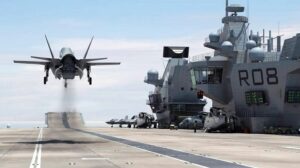UK Shifting Strategy After Russian Invasions: Philip Dunne
Posted on

A computer-generated image of a Royal Navy F-35B taking off vertically from the new carrier HMS Queen Elizabeth.
WASHINGTON: Prompted by the recent increase in aggressive actions by Russia, Britain’s head of defense procurement says his country is shifting its strategy in reaction.
“We are refreshing our national risk assessment, which is influencing our national security strategy,” said Philip Dunne. It is the first time since 2010 that the U.K. has reviewed its strategy, known formally as the Strategic Defence and Security Review. “We do recognize a different threat environment” from the last review, he said, referring to Russia’s much more aggressive and frequent probes of British airspace and the invasion of Ukraine.
American defense officials from Air Force Secretary Deborah Lee James to presumptive Chairman of the Joint Chiefs, Gen. Joseph Dunford, have recently identified Russia as America’s top threat. Dunne’s comments would seem to indicate that Britain agrees.
Dunne, who met this morning with Deputy Defense Secretary Bob Work and his Pentagon counterpart, Frank Kendall, said little about the content of those meetings. But you can be sure the Marine’s Initial Operating Capability (IOC) was a topic since Britain will be flying the same version of the Joint Strike Fighter as do the Marines, the F-35B. Marine Commandant Gen. Joseph Dunford should be making his final decision soon about whether the F-35B is ready to go to war.
Dunne, as the English will do taking their appalling Official Secrets Act as a basic guide, declined to discuss the agenda of his meeting.
Dunne defended the British legerdemain of boosting its “defense” spending to the 2 percent targeted by NATO and urged by senior American officials when it looked like the UK would substantially drop its defense sending. Former US Defense Secretary William Cohen, whose company the Cohen Group organized today’s rare on the record event with Dunne, and I chatted before lunch started about the “smoke and mirrors” of the British spending move. Britain included funding for its version of the National Security Agency, known as GCHQ, in its defense spending. Many critics have said the UK is padding its defense budget to artificially meet the NATO target of spending 2 percent of GDP on defense. Cohen very kindly made this the subject of his introductory question to Dunne.
“It’s NATO that have determined independently the target for the UK,” Dunne said, graciously admitting that it’s “not quite the definition we’ve used in the past.” So NATO apparently allows the inclusion of intelligence funding as part of a nation’s defense budget. Fair enough. But it’s not the way the Brits have done things in the past and they were under a great deal of pressure from the U.S. to boost spending to that level as a signal to the rest of NATO. As a reminder, the United States now contributes about 75 percent of NATO defense spending, compared to 25 percent for all the rest of the alliance. Before 9/11, the distribution was 50-50.
.
Subscribe to our newsletter
Promotions, new products and sales. Directly to your inbox.
